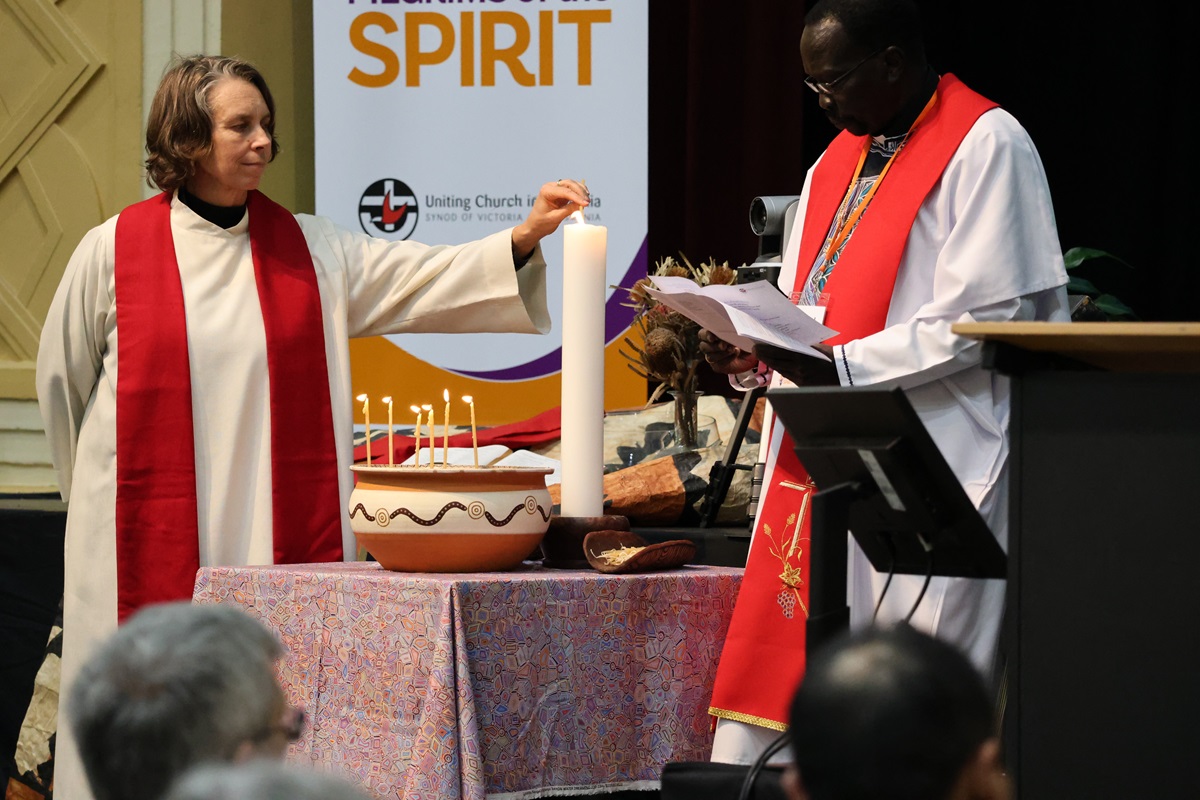
The Tributes Service was one of the highlights on day two of Synod 2025.
Moderator Rev Salesi Faupula’s strong show of support for those impacted by an anti-immigration march in Melbourne has been at the forefront of tonight’s final session of day two of Synod 2025.
In offering support for those who may feel unwelcome or unwanted following today’s march, Salesi said the Uniting Church held them closely in prayer.
“These protests can stir fear and hurt, particularly for migrants, refugees and people from multicultural communities who may feel singled out, or unwelcome,” he said.
“These protests do not reflect who we are as the Uniting Church.”
Click here to read Salesi’s full statement.
Day two wrapped up a full and busy day for Synod members, with President Rev Charissa Suli addressing members tonight, a Tributes Service held this afternoon and discussion continuing around proposals.
During the Assembly’s report, Charissa called on Victorian and Tasmanian members of the Uniting Church to embrace the opportunities offered through multiculturalism.
Recognising 40 years of the Uniting Church being a multicultural Church, she said she was “profoundly moved by how our diversity reflects the life of the Spirit”.
“Our intercultural gatherings – Tongan, Korean, Fijian, Samoan, Chinese and many more – are not simply cultural events; they are acts of worship,” she said.
As the Church as a whole embraces the Act2 Project, Charissa said it offered the opportunity for Synod of Victoria and Tasmania members to work through the challenges that lie ahead.
“We face many challenges as a Church across our life,” she said.
“We need to be honest about those challenges as we have been through the Act2 Project and find ways to come together and support each other to continue to give expression to the mission to which God calls us.
“The Synod of Victoria and Tasmania has an important role to play in this work as one of our largest and most well-resourced Synods.
“We will need to work in new ways and share our common life and wealth in more radical ways to give full expression to being a truly national Church.”
Click here to read a summary of Charissa’s report.
Members today also had the opportunity to recognise ministers for their faithful contribution to the life of the Church, through the Tributes Service which is held at every Synod meeting.
Members offered an act of thanksgiving for ministers who had died since the last Synod meeting in 2023, while tributes were also paid to ministers who had retired since the 2023 meeting, been ordained, or received from other denominations.
Ministers who have celebrated or will celebrate 25, 50, 60, 65 and 70 years since ordination or commissioning between June 2024 and December 2025, were also recognised today.
Discussion took place throughout the day on two of the most important issues to go before Synod 2025, the Faithful Futures Project and the Synod’s response to the Yoorrook Justice Commission’s recent report calling on churches to consider returning land to its original First Peoples owners, and to share with First Peoples proceeds from any future sales of land that was acquired by the Church after it had been seized from First Peoples by the Crown.
The Faithful Futures Project dominated discussion today, with members afforded an opportunity to explore in detail what they are being asked to consider.
Emerging from extensive discussion and consultation between the Synod and Presbyteries, the Faithful Futures Project outlines four goals which will guide ministry and mission directions in Victoria and Tasmania for the next 10 to 15 years.
The goals are:
Coordinated Ministries: Coordinated ministry and mission in geographic areas such as Local Government Areas, attentive to the life and needs of the local context, by 2030.
Respecting Country: All communities of faith will be able to tell some of the story of the Country on which they are located by the end of 2028 and be invited to develop local and appropriate ways to respond.
Intercultural Leadership: By 2028 to (a) be providing appropriate formation and equipping for leaders of different cultural groups; and (b) develop networks to support worship, witness and service among communities of diverse languages and cultures.
All-Age Growth: To have at least one all-age community of faith that is interactive, diverse, inclusive and transformative in 80 per cent of Coordinated Ministries by 2030.
Spirited discussion throughout the day and this evening has been unable to resolve a number of concerns held by some members around the Faithful Futures Project, and that discussion will now continue over the remainder of Synod 2025.
The Synod’s response to the Yoorrook Justice Commission’s report will also be explored in further detail before the meeting concludes on Tuesday.


Comments are closed.